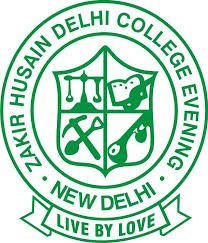Bachelor of Science (Honours) [B.Sc. (Hons.)]
3 Years
B.Sc. (Hons.) Overview:
The B.Sc. (Hons.) program is typically three years long and is divided into six semesters (two semesters per year). It provides in-depth knowledge in a specific scientific field while also covering general science principles.
Specializations Offered:
At Zakir Husain Delhi College (Evening), the B.Sc. (Hons.) program is offered in several disciplines, such as:
-
B.Sc. (Hons.) Chemistry
-
B.Sc. (Hons.) Physics
-
B.Sc. (Hons.) Mathematics
-
B.Sc. (Hons.) Botany
-
B.Sc. (Hons.) Zoology
The exact specializations available may vary from year to year, so it's important to check the specific program offerings during the admission cycle.
Program Structure:
The B.Sc. (Hons.) program is structured in a way that helps students develop both practical and theoretical skills in their chosen discipline. Here’s an outline of how the program is typically structured:
Year 1 (Semester 1 & 2):
-
Core Courses:
-
The first year focuses on foundational subjects, including introductory courses in the chosen field (e.g., Chemistry, Physics, Mathematics, Biology) along with practical laboratory sessions.
-
Students will study subjects like Physical Chemistry, Organic Chemistry, Mathematical Methods, Introduction to Physics, Botany, or Zoology (depending on their chosen discipline).
-
-
Ability Enhancement Courses (AEC): These may include courses designed to improve skills like English communication and environmental science.
Year 2 (Semester 3 & 4):
-
Advanced Core Subjects:
-
In the second year, students will study more advanced concepts specific to their chosen specialization. For example, in Chemistry, students may study Inorganic Chemistry, Quantum Mechanics (for Physics), or Genetics (for Zoology/Botany).
-
Practical training and laboratory work are emphasized, allowing students to apply theoretical knowledge to experiments.
-
-
Elective Courses: Students may have the option to choose elective subjects that complement their main course of study or help them explore new areas within science.
Year 3 (Semester 5 & 6):
-
Specialized Courses:
-
In the final year, students focus on specialized courses and may engage in research projects or independent study under faculty supervision.
-
Subjects might include advanced topics such as Spectroscopy, Astrophysics, Bioinformatics, Advanced Calculus, and more, depending on the chosen field.
-
-
Research/Project Work: Some students are required to complete a research project or dissertation as part of their final-year assessment. This allows them to dive deeper into a specific area of interest.
Core and Elective Subjects:
The B.Sc. (Hons.) program includes a combination of core subjects and elective subjects. For example:
-
Core Subjects:
-
Inorganic Chemistry, Physical Chemistry, Organic Chemistry (for Chemistry students)
-
Electrodynamics, Thermodynamics, Quantum Mechanics (for Physics students)
-
Calculus, Linear Algebra, Real Analysis (for Mathematics students)
-
Plant Physiology, Cell Biology, Ecology (for Botany students)
-
Genetics, Animal Physiology, Evolutionary Biology (for Zoology students)
-
-
Elective Subjects: Students may choose electives based on their interests, such as:
-
Environmental Science, Biochemistry, Nanotechnology, Computational Chemistry, Astrobiology, etc.
-
Assessment and Evaluation:
-
Internal Assessments: These include assignments, quizzes, presentations, mid-term exams, and laboratory work.
-
End-Semester Examinations: The final exams assess students on their understanding of the core and elective subjects studied during the semester.
Skills Developed:
Throughout the B.Sc. (Hons.) program, students develop a wide range of skills, including:
-
Research Skills: Ability to conduct experiments, analyze data, and apply scientific methods.
-
Critical Thinking: Problem-solving and analytical skills, essential for addressing scientific challenges.
-
Technical Skills: Expertise in laboratory techniques, scientific tools, and equipment.
-
Communication Skills: Ability to effectively present scientific data and research findings.
Career Opportunities After B.Sc. (Hons.):
Graduates of the B.Sc. (Hons.) program from Zakir Husain Delhi College (Evening) can pursue various career paths, including:
-
Further Studies:
-
M.Sc. (Master of Science) in their chosen field (e.g., M.Sc. in Chemistry, M.Sc. in Physics, M.Sc. in Biology).
-
M.Phil. or Ph.D. for those interested in advanced research or academia.
-
-
Research and Development:
-
Work in laboratories, research institutes, and scientific organizations in roles such as research assistants, scientific researchers, or lab technicians.
-
In fields like pharmaceuticals, biotechnology, environmental science, and material science.
-
-
Teaching:
-
After further studies, graduates can become teachers in schools or professors in colleges and universities.
-
-
Industry:
-
Graduates can work in various industries such as pharmaceuticals, chemical, biotech, IT, and engineering.
-
Roles could include scientific advisor, data analyst, quality control officer, or product developer.
-
-
Government Jobs:
-
Appear for government exams such as the UPSC, SSC, or State PSCs for roles in research, administration, or scientific institutions.
-
Public sector enterprises like BHEL, ISRO, and DRDO also offer roles for science graduates.
-
-
Entrepreneurship:
-
Graduates can start their own ventures, especially in sectors like biotechnology, environmental consulting, or pharmaceuticals.
-
-
Private Sector:
-
Graduates can also work in private sector companies, particularly in the pharmaceutical, chemical, and environmental industries.
-
Eligibility Criteria:
To be eligible for the B.Sc. (Hons.) program, candidates typically need:
-
A Senior Secondary Certificate (Class 12) from a recognized board, with a Science stream (including subjects like Physics, Chemistry, and Mathematics/Biology depending on the specialization).
-
Admission is usually based on the cut-off marks set by the University of Delhi.
Admission Process:
-
Application: Students must apply online via the University of Delhi's admission portal.
-
Cut-Offs: The admission process is based on merit, with cut-off lists released after the Class 12 results.
-
Documents: Students need to provide necessary documents like Class 12 marksheet, ID proof, and caste certificate (if applicable).






 OMAWATI686b96fcc7a5c.jpg)